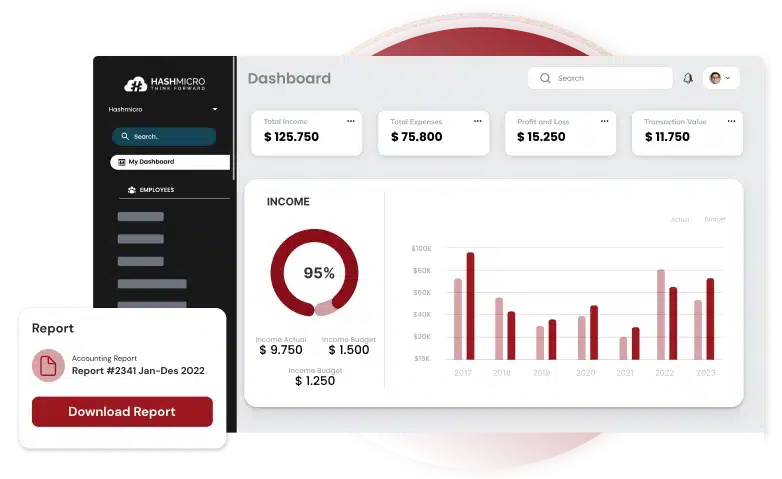In the ever-evolving digital era, digital transformation is no longer just an option, but a necessity for businesses to stay competitive in the modern age. However, many companies are capable of adopting digital systems but are reluctant to allocate the necessary investments, often citing cost efficiency as the reason.
Some businesses believe that their current methods are still adequate and that digital investments do not justify the benefits obtained. Ironically, this view can change drastically when faced with serious challenges that disrupt their conventional operations, and they realize that they are significantly behind in the competition.
In such emergencies, companies usually rush to digitize their processes, often at greater cost and effort than would be necessary if digital transformation had been embraced as a long-term strategy.
This ultimately limits business growth potential and can become an obstacle in achieving future success, increasing the risk of being unable to compete in an increasingly digital-dominated market.
Therefore, this article will discuss why digital transformation is the key to future business success and growth, and how digital transformation helps businesses capitalize on emerging opportunities.
This article is the first in a series of articles. In the following articles, you can learn about several key business processes that require digital transformation, such as supply chain, manufacturing, and accounting.
Key Takeaways
|
Table of Content:
Table of Content
Understanding the Importance of Digital Transformation in Business
Digital transformation is a business process that involves adopting digital technology to change the way businesses operate, add value to customers, and optimize business performance.
This transformation involves the use of technologies such as ERP (Enterprise Resource Planning) software, cloud computing, artificial intelligence, data analytics, and the Internet of Things (IoT) to enhance efficiency and innovation.
As digital tools become more integrated into core strategies, businesses are seeking expert partners to navigate this shift effectively. Collaborating with an AI Development Company can help implement tailored, future-ready solutions that align with evolving digital goals.
Digital transformation is crucial for businesses in addressing changes in consumer behavior that increasingly rely on digital technology. By adopting digital transformation, businesses can achieve various positive impacts, including:
- Reducing operational costs: By reducing manual involvement, enhancing production efficiency, and adopting more flexible operational models, businesses can save costs.
- Increasing sales and company margins: Advanced data and analysis from digital systems can identify opportunities, understand customer preferences, and design effective pricing strategies. This, in turn, can increase sales and company margins.
- Enhancing efficiency: Digital transformation allows businesses to automate their entire processes and activities, reduce dependence on manual work, and overall increase operational efficiency.
- Improving data access and analytics: Businesses can use technology to collect, analyze, and interpret data. Accurate analytical data helps businesses make quick and informed decisions.
- Adapting to changes in consumer behavior: Businesses can adapt to changes and provide experiences that match consumer preferences in using digital technology.
- Enhancing competitiveness in the global market: Businesses can analyze market data and consumer behavior, optimize customer experiences, and accelerate decision-making. This is crucial to remain relevant, responsive, and competitive in an evolving market.
Comparison of Conventional Business and Digitally Transformed Business
Below is a comparison table between businesses still using conventional methods and those that have digitized their operational management.
| Aspect | Conventional Business | Digital Business |
|---|---|---|
| Sales | Hindered by manual sales processes and limited customer data, Year-Over-Year Growth tends to be stable or slightly increase, ranging from 5-10%. | With better analytics and more efficient sales processes, Year-Over-Year Growth can increase to 15-25% or more. |
| Purchasing | The purchasing process takes an average of 1-2 weeks from submission to final approval. | With automation, the process of creating purchase requests, sending RFQs (Request for Quotation), to final approval can be shortened to 1-2 days. |
| Inventory | Buffer stock to anticipate inventory data inaccuracies can reach 10-15%, resulting in higher storage costs. | With real-time data accuracy and predictive analytics, buffer stock can be reduced to 3-5%, lowering storage costs and increasing space efficiency. |
| Finance | Manual Accounts Receivable billing processes require an average of 1 month to reach settlement. | Accounts Receivable billing with systems can reduce the processing time to an average of 20 days. |
| Human Resources | Manual management of time and payroll might take up to 5-7 business days per payroll cycle. | Automation of HR administrative tasks reduces the time to 1-2 days, allowing focus on more strategic tasks such as employee development and retention. |
In the context of the importance of digital transformation in business, it is crucial to understand the differences between conventional businesses and those that have adopted digital transformation.
Conventional businesses tend to rely on manual processes, slow and intuition-based decision-making, and lack integration of technology in their operations. They may use traditional systems that are limited in data analysis and innovation.
On the other hand, businesses that have adopted digital transformation integrate advanced technology into every aspect of their operations. They have better access to real-time data, enabling faster and more accurate decision-making.
Furthermore, businesses that have undergone digital transformation tend to be more flexible and responsive to market changes and are capable of delivering a more personalized and digitally connected customer experience.
What Happens If Your Business Refuses Digital Transformation
When a business resists digital transformation, one often overlooked consequence is its impact on succession planning, or planning for leadership replacement.
Well-planned succession ensures that a business has leaders ready to take over and guide the business through future challenges, including navigating an evolving digital ecosystem.
Without digital transformation, businesses place themselves at several significant impacts, including:
Falling Behind in Competition
In an era where almost every industry is undergoing digitization, businesses that refuse to digitally transform risk falling behind more innovative and efficient competitors. They may lose market share to competitors capable of providing better and more responsive services.
Inability to Respond to Market Changes
Digital transformation enables businesses to be more responsive to market changes, consumer trends, and regulatory requirements. Businesses that do not adopt digital transformation may struggle to adjust their strategies quickly and effectively, which can lead to revenue declines and customer loss.
Decreased Operational Efficiency
Digital technology enables business process automation and enhances operational efficiency. Businesses that do not embrace digital transformation may face higher operational costs and lower productivity due to still relying on manual processes that are prone to errors.
Limited Access to Data and Insights
In modern business, data is a highly valuable asset. Digital transformation allows businesses to collect, analyze, and utilize data more effectively to make better decisions.
Without digital transformation, businesses may lack sufficient access to data or be unable to analyze it in a beneficial way, which can hinder their ability to innovate and compete.
Loss of Long-Term Competitive Edge
As technology continues to evolve, businesses that do not undergo digital transformation may struggle to remain relevant in the long term. They may lose their competitive edge because they are unable to keep up with new technological developments and industry trends.
Overall, resisting digital transformation can have detrimental impacts on the overall performance and sustainability of a business in the long term. Therefore, it is crucial for businesses to be open to change and adopt digital technology as an integral part of their strategy.
Trends and Future of Digital Transformation
Digital transformation continues to evolve with technological advancements. Here are some technology trends expected to drive digital transformation forward, along with predictions about the future of digital transformation and its implications for businesses:
- Enterprise Resource Planning (ERP): ERP systems will not only focus on the internal integration of business processes but will also expand their functionality for broader integration with external digital ecosystems, including suppliers, partners, and cloud service platforms.
- Cloud and Edge Computing: Cloud computing has already become a crucial pillar of digital transformation, and with the development of edge computing, data can be processed closer to its source, reducing latency and improving processing speed.
- Artificial Intelligence and Machine Learning: Machine Learning and AI development services are increasingly integrated into various aspects of business enabling automation, smarter decision-making, & deeper personalization.
- Cybersecurity: As digitalization increases, so does the risk of cybersecurity threats. Approaches to cybersecurity will become more critical, with technologies such as AI being used to identify potential threats before issues arise.
- Internet of Things (IoT): IoT enables more devices to connect and communicate, generating data that can be leveraged to optimize operations, enhance customer experiences, and create new products and services.

Need to Know
Digital transformation will become more profound and extensive, affecting nearly all aspects of business. Companies that can adopt and adapt to new technologies will gain a competitive advantage, while those slow to adapt may fall behind.
Implications for businesses include the need for continuous investment in new technologies, employee skill development, and business strategy adjustments to leverage these technologies.
Furthermore, enhanced collaboration between humans and machines, as well as changes in organizational structures and company culture, are necessary to support rapid innovation and adaptation.
Strategies for Overcoming Business Challenges with Digital Systems
Addressing business challenges with digital systems introduces solutions to common issues faced by businesses, such as inefficient inventory management, difficulties in accurately tracking financial data, lack of coordination between departments, and challenges in delivering good customer service.
By adopting digital transformation and utilizing digital systems like Enterprise Resource Planning (ERP) software, businesses can effectively overcome these challenges.
ERP software, such as that offered by HashMicro, aids businesses in automating processes, integrating data across departments, enhancing visibility into business operations, and improving customer experiences.
With comprehensive features and high scalability, HashMicro software can assist businesses in growing and competing in an increasingly competitive market, without sacrificing efficiency and service quality.
If you are interested in digitizing your business with HashMicro’s ERP software and maximizing business performance, you can learn about the pricing scheme by clicking the image below.
Case Study: Benefits of Implementing Digital Transformation in Business Processes
Digital transformation has become key to building business resilience and enhancing operational efficiency. With the aid of technology, businesses can innovate, adapt, and respond to market changes more quickly and effectively.
In this section, we will explore how digital transformation has helped companies overcome challenges and achieve remarkable success across various industries.
McDonald’s
McDonald’s is one of the largest fast-food restaurants in the world, founded in 1940 by Richard and Maurice McDonald in California. The company has experienced rapid growth and now operates in more than 100 countries, including Indonesia.
Previously, McDonald’s relied on a traditional ordering system where customers made orders and payments directly at the cashier. This process often resulted in long queues, ultimately affecting customer satisfaction and operational efficiency.
This issue could cause the company to miss business opportunities, as customers arriving at the restaurant and seeing long queues might lose the desire to buy due to the wait. Consequently, they might decide not to purchase and look for faster, more convenient restaurants instead.
Therefore, McDonald’s began its digital transformation by implementing a POS Kiosk or self-order system. This system allows customers to place orders and make payments through a digital kiosk without having to queue at the cashier.
With this system, McDonald’s was able to reduce waiting time for customers and increase throughput during busy hours, directly contributing to improved customer satisfaction and sales.
In the modern era, the role of technology has shifted from being an option to a necessity. The success stories of the two companies above demonstrate the importance of digital transformation in changing business paradigms and creating significant added value for the business as a whole.
Conclusion
Digital transformation provides opportunities to adapt to rapid changes in the business world. Digital transformation is no longer an option but a necessity for businesses that want to remain relevant and competitive in the modern era.
For those who may not yet see the need for digital transformation, consider the potential for long-term profitability and sustainability that can be brought by technological adaptation. A deeper understanding of the purposes and benefits of digital transformation can enhance the effectiveness of your business.
As a business leader, now is the time to implement or deepen digital transformation in your business. Evaluate where your business is heading and how technology can support that journey.
As a concrete step, why not consider HashMicro as your digital transformation partner? HashMicro offers advanced ERP software to help automate your business processes and enhance your business efficiency.
Don’t miss the opportunity to maximize your business performance with cutting-edge technology support. Try a free demo now!


























































